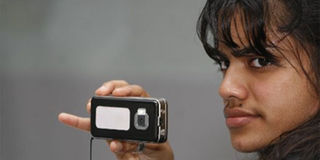Young Kenyan with a passion for mobile phone learning

Among the most impressive contributors to the discussion was Kenyan Jessica Colaco, who at the tender age of 26 is already a TED fellow and has created an impressive presence on the world stage. Photo/FILE
The focus of the second World Innovation Summit in Education conference (WISE, Doha December 7-9) was on the pressing problem of providing education for the masses especially in countries where numbers of youth are burgeoning (as opposed to the ageing populations of the west.)
Among the most impressive contributors to the discussion was Kenyan Jessica Colaco, who at the tender age of 26 is already a TED fellow and has created an impressive presence on the world stage.
Her passion for learning by using mobile phones is infectious: at the conference, the four grey-suited elderly men who sat next to her on the stage were completely bedazzled.
She showed early promise at Strathmore University where, as a student, she found herself being consulted on ways of managing mobile technology. She soon became manager of Nairobi’s iHub which was launched in March last year.
Several times a year she runs boot camps at which young people can come and have crash courses in a learning method which brushes aside stuffy school textbooks and classrooms, and gives the learner a chance to be creative and self -motivated.
In a world where there are not enough teachers, particularly forward-looking ones, the graduates of the mobile camps can teach others according to the time-honoured principle of Each One Teach One.
After all there’s nothing like teaching to enhance your own learning skills, is there? “We train the trainers,” she says. “We tap into the community.”
They share ideas and brainstorm in groups. Education is intended to be a communal activity which gives learners the power to direct their own growth.
The iHub develops mobile applications and is open to everyone. There are already 1,800 registered users. A three-tier membership model gives members the access to resources, books events and assistance.
It has uses in crises that no other medium has dreamt of: information about Haiti’s disastrous earthquake in January 2010, for instance, was relayed to people by mobile phones who were then able to provide help on the ground where it was most needed.
“Thirty per cent of Kenyans have mobile phones,” Jessica argues. “How can we tap into this?” This is a whole new model of learning which sees as its goal constant evolution and the ability to put into practice lifelong learning. Words are often replaced by games, images, colour coding and mathematics.
But language skills certain haven’t been left out: IVR (Individual Voice Recognition) allows learners to choose from a menu options which enable them to have short bursts of instruction at frequent intervals — the best way of learning, especially with languages which require constant reinforcement.
As part of her presentation Jessica showed an advertisement where a shy woman has to answer her husband’s phone in English; he is in the shower and she has to respond which she does, charmingly.
“He will get back to you as soon as he can,” she replies, smiling. The confidence such knowledge can bring is a great motivator for learning. And it puts into practice that maxim so often talked about but rarely used in classrooms: don’t talk about it. Do it.




